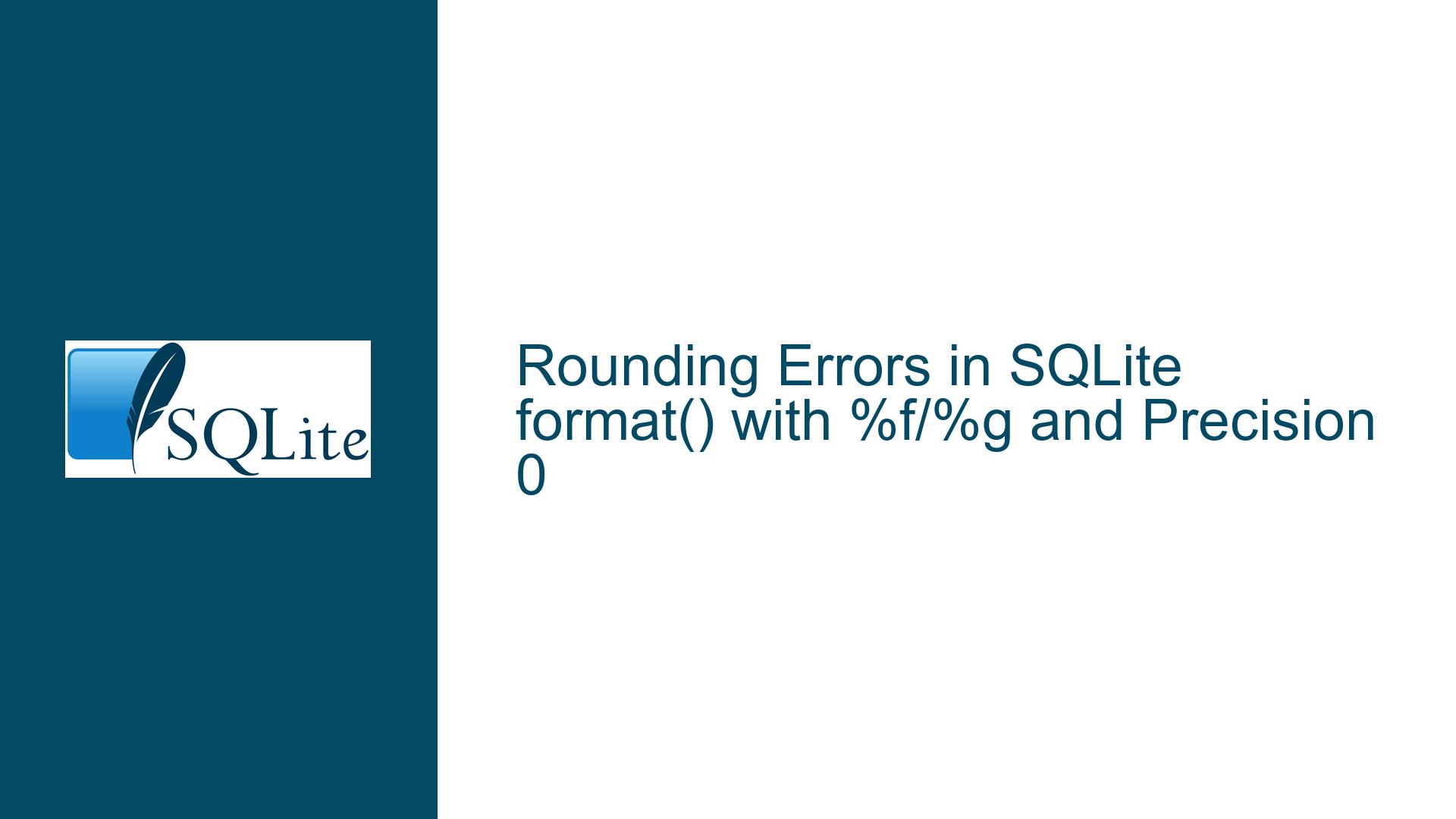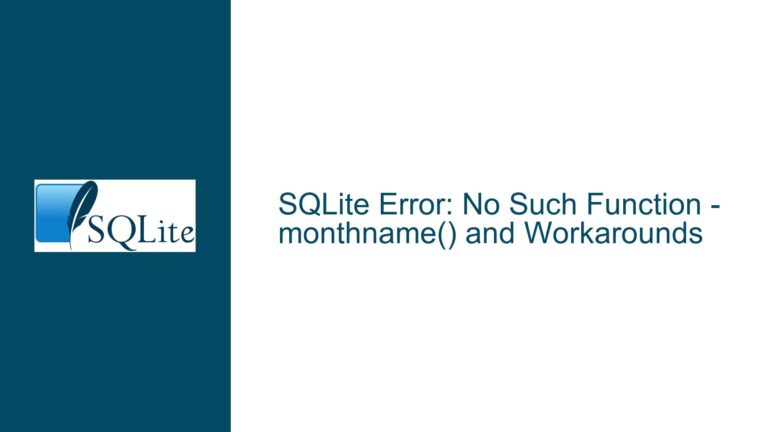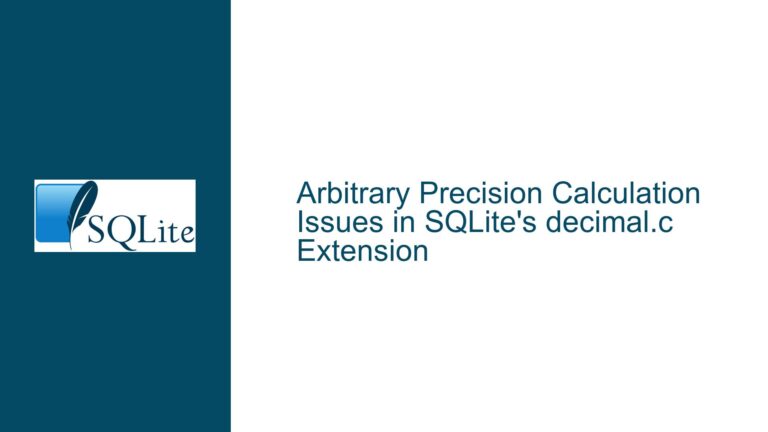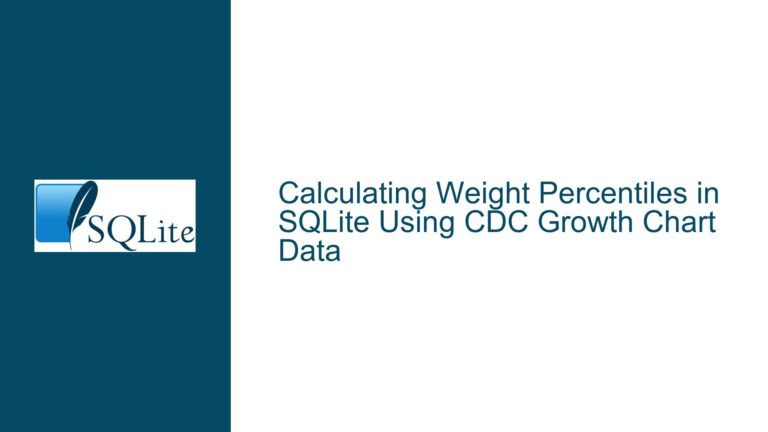Rounding Errors in SQLite format() with %f/%g and Precision 0
Issue Overview: format() Function Rounding Inconsistencies in Recent SQLite Versions
The SQLite format() function, which leverages the printf()-style formatting engine, has exhibited unexpected rounding behavior when using %f or %g conversion specifiers with a precision of 0 in versions 3.43.0 and later. This regression introduces discrepancies compared to prior versions (e.g., 3.42.0) and deviates from standard C printf() behavior. Key examples include:
Case 1:
%0.0fConversion
In SQLite 3.42.0,SELECT format('%0.0f', 0.9);returns1, adhering to correct rounding rules (rounding 0.9 to the nearest integer). However, versions 3.43.0 through 3.45.1 return0, truncating the value instead of rounding.
Expected Behavior:0.9→1(rounded up).
Observed Behavior:0.9→0(truncated).Case 2:
%0.0gConversion with Sub-1 Values
ForSELECT format('%0.0g', 0.09);, SQLite 3.42.0 returns0.09, preserving the value as-is with a precision of 0 for%g(interpreted as 1 significant digit). In 3.45.1, this becomes0.08, incorrectly rounding down.
Expected Behavior:0.09→0.1(rounded to 1 significant digit).
Observed Behavior:0.09→0.08(incorrect rounding).Case 3:
%0.0gConversion with Values ≥1
SELECT format('%0.0g', 1.9);returns2in SQLite 3.42.0 (correct rounding to 1 significant digit) but1in 3.45.1 (truncation).
Expected Behavior:1.9→2(rounded up).
Observed Behavior:1.9→1(truncated).
This regression stems from changes in SQLite’s internal rounding logic for floating-point conversions. The issue is compounded by ambiguities in SQLite’s documentation regarding the interpretation of precision for %g/%G conversions. Specifically, the documentation incorrectly states that precision for %g/%G specifies the number of digits after the decimal point, whereas it should define the number of significant digits, aligning with C standard printf() behavior.
Possible Causes: Precision Handling and Rounding Logic Changes
1. Incorrect Rounding Logic for Zero-Precision Conversions
In SQLite versions 3.43.0–3.45.1, the internal implementation of %0.0f and %0.0g conversions erroneously truncated fractional values instead of applying proper rounding. For %f, precision 0 implies rounding to the nearest integer. For %g, precision 0 is equivalent to precision 1 (1 significant digit) per C standard conventions. The faulty logic caused:
0.9to be truncated to0instead of rounded to1.1.9to be truncated to1instead of rounded to2.- Sub-1 values like
0.09to be mishandled due to incorrect exponent adjustments during rounding.
2. Documentation Misalignment with C Standard Behavior
SQLite’s printf() documentation inaccurately states:
"For floating-point substitutions (%e, %E, %f, %g, %G) the precision specifies the number of digits to display to the right of the decimal point."
This is incorrect for %g/%G, where precision defines the number of significant digits, not decimal places. For example:
%0.0gon0.09should round to0.1(1 significant digit), not0.09(2 decimal places).%0.0gon1.9should round to2(1 significant digit), not1.9(1 decimal place).
The documentation error creates confusion, as users expect SQLite’s format() to behave like C’s printf(), which defines precision for %g as significant digits.
3. Ambiguity in Handling Zero Precision for %g/%G
The C standard (C11 §7.21.6.1) specifies that a precision of 0 for %g/%G is treated as 1. SQLite’s implementation in affected versions mishandled edge cases where rounding a value to 1 significant digit required adjusting the exponent (e.g., 0.09 → 0.1), leading to incorrect results like 0.08.
Troubleshooting Steps, Solutions & Fixes
1. Verify SQLite Version and Apply Patches
Step 1: Check SQLite Version
Run SELECT sqlite_version(); to confirm the version. Affected versions are 3.43.0–3.45.1.
Step 2: Update to SQLite 3.45.2 or Later
The fix was implemented in check-in 7fca1bc482fc2456. Ensure your SQLite build includes this commit or use version 3.45.2+.
Step 3: Validate Rounding Behavior
Re-run problematic queries:
SELECT format('%0.0f', 0.9); -- Should return 1
SELECT format('%0.0g', 0.09); -- Should return 0.1
SELECT format('%0.0g', 1.9); -- Should return 2
If results match expectations, the fix is effective.
2. Workarounds for Unpatched Versions
If updating is not feasible, use explicit rounding functions:
-- For %0.0f behavior:
SELECT CAST(ROUND(0.9) AS INTEGER); -- Returns 1
-- For %0.0g behavior:
SELECT
CASE
WHEN ABS(value) < 1 THEN ROUND(value * 10) / 10
ELSE ROUND(value)
END;
This mimics %g’s significant digit rounding by scaling sub-1 values before rounding.
3. Correct Documentation Interpretation
Revise understanding of %g/%G precision:
- Precision = Significant Digits, not decimal places.
- Precision 0 = Precision 1 for
%g/%G.
Example Corrections:
%0.0gon0.09→0.1(1 significant digit).%0.0gon1234→1e+03(1 significant digit in exponential notation).
4. Adjust Application Logic for Precision Handling
When migrating from SQLite <3.43.0 to ≥3.43.0, audit queries using format() with %f/%g and precision 0. Test edge cases like:
- Values ending in
.5(rounding midpoint). - Sub-1 values requiring exponent adjustments.
5. Contribute to Documentation Clarification
The SQLite documentation will be updated to reflect:
For floating-point substitutions (%e, %E, %f) the precision specifies the number of digits to display to the right of the decimal point. For %g and %G, the precision specifies the number of significant digits. A precision of 0 for %g or %G is treated as 1.
Monitor SQLite’s printf() documentation for updates and adjust coding practices accordingly.
By following these steps, users can resolve rounding inconsistencies, align with C standard behavior, and ensure accurate results in format()-driven queries.






